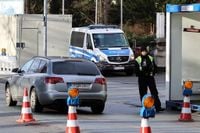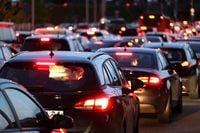Germany has implemented permanent border controls on its borders with Poland and other neighboring countries, starting on May 6, 2025. This significant move, announced by Thorsten Frei, the future head of the Chancellery, aims to curb illegal immigration and enhance internal security. According to Frei, "Anyone attempting to enter Germany illegally must know that as of May 6, this is over at the German border." The new regulations require travelers to present valid identification, such as passports or ID cards, and those without proper documentation will be turned back.
The introduction of these measures has already resulted in noticeable traffic disruptions. On the A4 motorway at the Jędrzychowice border crossing, there was a 2.5-kilometer traffic jam reported at 8:00 AM on the first day of the new controls. Access to the motorway from national road 94 was also problematic, with a traffic jam stretching nearly 2 kilometers. Additionally, another traffic jam formed on the bridge over the Lusatian Neisse in Zgorzelec, leading to Goerlitz, causing delays along several streets, including Piłsudskiego, Daszyńskiego, and Kościuszki.
At the Olszyna-Forst border crossing, located in the Lubusz Voivodeship and the beginning of the A18 motorway, a 1-kilometer traffic jam was also reported. The situation on the E-30 road section from Świecko to Frankfurt added to the congestion, where a traffic jam of about 2 kilometers was noted. Local police and border guard representatives stated that while they continue regular patrols, the German side is responsible for conducting the border checks, which occasionally cause traffic slowdowns.
The permanent border controls are part of a broader strategy by the German government to address rising concerns over illegal migration and enhance national security. Since September 2024, Germany had already initiated temporary border controls, which were set to last for six months. These measures were a response to the increasing number of illegal crossings and security issues. Experts have pointed out that such controls complicate the lives of cross-border workers and local businesses, as they hinder the free flow of goods and services.
Hanna Mojsiuk, president of the Northern Chamber of Commerce in Szczecin, highlighted the serious challenges these controls pose for entrepreneurs. Many businesses had established themselves near the border due to the ease of cross-border trade. However, with the introduction of permanent checks, integration in the Polish-German border region is becoming increasingly difficult, affecting business collaboration.
Przemysław Hołowacz from the CSL Group noted that the longer wait times at the border are a significant issue for drivers and entrepreneurs. Ongoing road repairs are further complicating the situation, potentially leading to delays in deliveries. In the first nine months of 2024, the federal police from Frankfurt nad Odrą apprehended over 5,500 foreigners, with 4,500 being turned back, indicating the scale of the issue at hand.
With the new border controls now in effect, travelers heading to Germany must prepare for mandatory document checks and detailed inspections of luggage and vehicles. The German authorities have stated that these measures are coordinated with neighboring countries, including Poland, to ensure a unified approach to border security.
Looking ahead, the new Minister of the Interior, Alexander Dobrindt, has pledged to intensify efforts against illegal migration. Starting May 7, 2025, he plans to launch an offensive that includes increasing the number of border checks and the rate of refusals for those who do not meet entry requirements. Dobrindt emphasized, "After taking office on Wednesday, we will make initial decisions. We will increase controls and the number of people turned back." This could mean that the congestion at border crossings might worsen, especially during weekends and holidays when traffic is already heavy.
As the situation develops, residents in border regions, particularly those commuting from Poland to Germany for work, are advised to prepare for longer travel times and increased operational costs due to the extended delays at border crossings. The Zgorzelec police have urged drivers to redirect personal vehicles to the Radomierzyce crossing and trucks to the Sieniawka border crossing to alleviate congestion on the A4.
The implications of these new regulations extend beyond mere inconvenience. Local businesses that rely on the swift movement of goods and services are bracing for the impact of these changes. The integration of the Polish and German economies, which has thrived on the free movement of people and commerce, faces significant challenges ahead.
In summary, the introduction of permanent border controls by Germany marks a pivotal shift in cross-border relations and security policy. While the government asserts that these measures are necessary for national security and to combat illegal migration, the repercussions for local economies and cross-border workers are profound. As both countries navigate this new reality, finding a balance between security and economic cooperation will be crucial for the future of the region.



